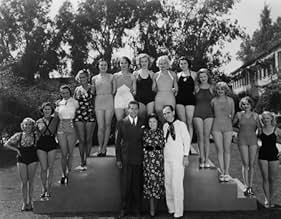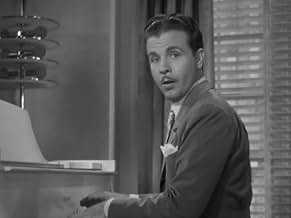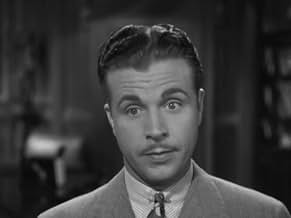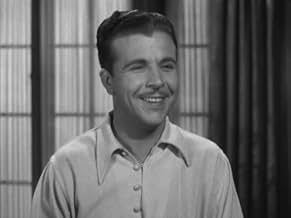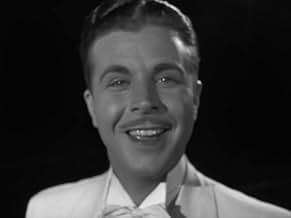IMDb-BEWERTUNG
6,4/10
1311
IHRE BEWERTUNG
Füge eine Handlung in deiner Sprache hinzuWhen two investors inform an opportunistic dancer that they can't fund an elderly stage producer's production, she suggests they get an insurance policy on the producer's life.When two investors inform an opportunistic dancer that they can't fund an elderly stage producer's production, she suggests they get an insurance policy on the producer's life.When two investors inform an opportunistic dancer that they can't fund an elderly stage producer's production, she suggests they get an insurance policy on the producer's life.
- Für 1 Oscar nominiert
- 2 Gewinne & 1 Nominierung insgesamt
Charles D. Brown
- Hugo
- (as Chas. D. Brown)
William B. Davidson
- Andy Callahan
- (as Wm. Davidson)
Bobbie Adams
- Chorus Girl
- (Nicht genannt)
Iris Adrian
- Verna
- (Nicht genannt)
Empfohlene Bewertungen
Gold Diggers of 1933 was a terrific film with some of Busby Berkeley's best material. Gold Diggers of 1935 was almost as good too, but this was a little disappointing. Apart from the cracking final number All's Fair in Love and War Berkeley's choreography lacks excitement and has a rather toned down feeling to it(censorship no doubt had something to do with it). While it still looks quite nice, it's nicely shot and the costumes are well-tailored, there is also a sense with the less-than-grand sets and how some scenes are staged that there was a lack of budget. Dick Powell sings beautifully and has a charming appearance but can have a tendency to be a little too sappy and wooden here. The songs are very nice and catchy still, Speaking of the Weather is charming and All's Fair in Love and War is catchy and in all respects the highlight of the film. There's plenty of snappy dialogue to savour also, and while with some silly moments the plot is actually pretty decent and paced well. The performances compliment the film nicely, Victor Moore is very funny and wonderfully cranky, Joan Blondell still charms even when in more subdued mode and Glenda Farrell is deliciously sassy, coming this close to stealing the film whenever she appears. All in all, disappointing but still enjoyable. 7/10 Bethany Cox
The heyday of the Warner Bros./Busby Berkeley musicals was on the wane by 1936. While the key films of the series ("42nd Street" [1933], "Gold Diggers of 1933" [1933]) dealt with putting on a show, and the numbers being parts of that show, Hollywood musicals by the mid-30s were starting to shift to "book numbers," with characters singing and dancing when they should have been talking or walking. "Gold Diggers of 1937" is an attempt by Berkeley to follow this trend, but still hang onto what had worked in the past for him. So there are book numbers and at least one major "show number." The results are middling.
Another factor that gave the WB/Berkeley musicals so much energy was the tough talk and slightly risque innuendo that was sparked by the desperation of the dark days of the Depression. By 1936, there were specific factors in place to reign this in. The Production Code was now enforced, keeping the Hollywood studios from including the overtly sexual material that livened so many of Berkeley's numbers.
Also, with Roosevelt's election to president, popular opinion swayed from cynicism and frustration to hope and support of the system. The early Berkeley films were nothing if not an expression of hard-bitten despair. In "Gold Diggers of 1937," we still have women forced to use their sexuality on oily moneymen in order to survive economically (one actually says at one point, "It's so hard to be good under the capitalistic system"--Imagine!). But, unlike the early films in the series, this film wants you to feel sympathetic for the millionaire (instead of seeing him as the oppressor).
While the studio did give the film some strong stars, the budget seems somewhat lower than usual for Berkeley musicals--except for the final musical number, "All's Fair in Love and War." It's a real stunner--surreal, amazing visuals that stand up to comparison with just about any of Berkeley's greatest numbers. It's probably worth sitting through all of the forced comedy just to get to this one number.
Another factor that gave the WB/Berkeley musicals so much energy was the tough talk and slightly risque innuendo that was sparked by the desperation of the dark days of the Depression. By 1936, there were specific factors in place to reign this in. The Production Code was now enforced, keeping the Hollywood studios from including the overtly sexual material that livened so many of Berkeley's numbers.
Also, with Roosevelt's election to president, popular opinion swayed from cynicism and frustration to hope and support of the system. The early Berkeley films were nothing if not an expression of hard-bitten despair. In "Gold Diggers of 1937," we still have women forced to use their sexuality on oily moneymen in order to survive economically (one actually says at one point, "It's so hard to be good under the capitalistic system"--Imagine!). But, unlike the early films in the series, this film wants you to feel sympathetic for the millionaire (instead of seeing him as the oppressor).
While the studio did give the film some strong stars, the budget seems somewhat lower than usual for Berkeley musicals--except for the final musical number, "All's Fair in Love and War." It's a real stunner--surreal, amazing visuals that stand up to comparison with just about any of Berkeley's greatest numbers. It's probably worth sitting through all of the forced comedy just to get to this one number.
Busby Berkeley's films are the most concentrated tease in the history of movies. it is over an hour into 'Gold Diggers of 1937' before we get any real meat - an astonishing, gossamer-erotic Gatsby-orgy filmed in the manner of Riefenstahl, all glowing Aryan bodies with their glistening mammillae, and idealised framing; with the kind of multi-character cutting of a song Paul Thomas Anderson would borrow for 'Magnolia'; and a magnificent extended tap-dance leading to an agreeable Berkeley fancy, the huge male dancer hand-standing over a bridge of female arms like a fly evading a web - after two tantalising duets featuring Dick Powell and Ruby Keeler that threaten to explode into full-blown imaginative hysteria, but are cut short.
Of course, this is the Berkeley method - coitus interruptus - and our deferred gratification is mirrored in a plot where the hero must prove himself worthy of the heroine before he can have her; the final extravaganza thus functions as a sexual/marriage rite, concluding in a consummating kiss. And what an extravaganza it is - less overt than '1935', but full of fetishised phallic implements, swirling clitoral circles and rocking chairs. Against a sharp black background, our phosphorescent heroes play out their immemorial rites, the heterosexual struggle linked to war (and not to the men's advantage). This idea leads to some striking sequences, including a priapic cannon with a pair of adjacent ball-piles, and a scene of 'trench' warfare, where the skirted female soldiers in 'No Man's Land' triumph through a blitzkrieg of firearms and perfume. There is no way actual sex could ever be better than this.
It is traditional in celebrating Busby Berkeley movies to denigrate the plots as amiable, necessary time-passers before the visual disruption. I always find them highly entertaining, and '1937' has one of the best: an excellently plotted farce combining gold-diggers, an inept salesman, a hypochondriac theatre impressario and his corrupt sidekicks.
This fun plot is noticeable for two things - the extraordinary sexual honesty that persists in spite of Messrs. Hays' and Breen's best efforts: this is a Depression where a woman must prostitute herself for a meal, never mind a marriage; as Glenda Farrell says 'It is so hard to be good under the capitalistic system' (!). The film opens with Powell insisting on the link between financial security and marriage, and the glistening sea of gold moistening the opening credits certainly have a sexual force.
More enjoyable is the portrait of the two heels who try to kill their boss having lost all his money in a Stock Exchange scam, hoping to cash in on his insurance. this kind of plot is quite shocking in such a genre, and we are expected to laugh at various unsuccessful murder attempts (and we do: the whispers for help when they hurl JJ into the pool are hilarious). These are not cartoon villains but the kind of middle-aged, middle class men we might meet in film noir or the novels of Simenon, men whose souls have been made hard by routine, and the American insistence on success. They would have made good collaborators.
In 1933, the 'Gold Diggers' poignantly recorded the effects of the Depression: things haven't really improved four years later, but, significantly, the idea is emerging that if you throw enough razzmatazz, noise, bands and empty phrases at a problem it will go away. it's not for nothing that the two leads are an insurance man and an actress. Powell is amiable in a silly moustache, sillier name and a cheerful pessimism; Blondell is bubbly and serious and lovely as ever; the revelation, however, are Glenda Farrell, convincingly transforming from cynical modern woman to accomplice of scoundrels to loving wife; and Victor Moore, as the inimitable, whining, lonely JJ.
Of course, this is the Berkeley method - coitus interruptus - and our deferred gratification is mirrored in a plot where the hero must prove himself worthy of the heroine before he can have her; the final extravaganza thus functions as a sexual/marriage rite, concluding in a consummating kiss. And what an extravaganza it is - less overt than '1935', but full of fetishised phallic implements, swirling clitoral circles and rocking chairs. Against a sharp black background, our phosphorescent heroes play out their immemorial rites, the heterosexual struggle linked to war (and not to the men's advantage). This idea leads to some striking sequences, including a priapic cannon with a pair of adjacent ball-piles, and a scene of 'trench' warfare, where the skirted female soldiers in 'No Man's Land' triumph through a blitzkrieg of firearms and perfume. There is no way actual sex could ever be better than this.
It is traditional in celebrating Busby Berkeley movies to denigrate the plots as amiable, necessary time-passers before the visual disruption. I always find them highly entertaining, and '1937' has one of the best: an excellently plotted farce combining gold-diggers, an inept salesman, a hypochondriac theatre impressario and his corrupt sidekicks.
This fun plot is noticeable for two things - the extraordinary sexual honesty that persists in spite of Messrs. Hays' and Breen's best efforts: this is a Depression where a woman must prostitute herself for a meal, never mind a marriage; as Glenda Farrell says 'It is so hard to be good under the capitalistic system' (!). The film opens with Powell insisting on the link between financial security and marriage, and the glistening sea of gold moistening the opening credits certainly have a sexual force.
More enjoyable is the portrait of the two heels who try to kill their boss having lost all his money in a Stock Exchange scam, hoping to cash in on his insurance. this kind of plot is quite shocking in such a genre, and we are expected to laugh at various unsuccessful murder attempts (and we do: the whispers for help when they hurl JJ into the pool are hilarious). These are not cartoon villains but the kind of middle-aged, middle class men we might meet in film noir or the novels of Simenon, men whose souls have been made hard by routine, and the American insistence on success. They would have made good collaborators.
In 1933, the 'Gold Diggers' poignantly recorded the effects of the Depression: things haven't really improved four years later, but, significantly, the idea is emerging that if you throw enough razzmatazz, noise, bands and empty phrases at a problem it will go away. it's not for nothing that the two leads are an insurance man and an actress. Powell is amiable in a silly moustache, sillier name and a cheerful pessimism; Blondell is bubbly and serious and lovely as ever; the revelation, however, are Glenda Farrell, convincingly transforming from cynical modern woman to accomplice of scoundrels to loving wife; and Victor Moore, as the inimitable, whining, lonely JJ.
Dick Powell is an insurance salesman who sells a million dollar policy to a producer in "Gold Diggers of 1937" also starring Joan Blondell, Victor Moore, Osgood Perkins and Glenda Farrell.
Due to bad investments by his staff, producer/hypochondriac Hobart (Moore) has no idea that the show he's planning to put on can't be financed. The men responsible for losing his money get Rosmer (Powell), an insurance salesman, to sell Hobart a $1 million policy, figuring he won't live and then the show can be done.
The funniest part of the movie is when Rosmer tells his fellow insurance salesmen of his coup and then announces that Hobart is 59. "59!" one of them exclaims. "He'll never pass the physical." "We sold a policy to a 68-year-old last year," someone says, "and he passed." "Yeah," the reply is, "passed OUT."
Interesting that 59 was thought of as more than 79 in the '30s. Coincidentally, Dick Powell himself died at the age of 59.
It's Rosmer's job to keep Hobart alive and it's his partners' job to help him to the pearly gates. They send in Glenda Farrell to break his heart, figuring he'll want to end it all, but things don't work out as they planned.
They throw him in a pool at a party; he doesn't catch cold, nor does he drown. It's actually pretty funny.
There are some pleasant songs which Powell sings beautifully, and a big Busby Berkeley number at the end, but I imagine as this is part of a series of "Gold Digger" films, audiences wanted something more.
The performances are good - chameleon Powell is a great, earnest salesman, Joan Blondell (who was either Powell's wife or about to become his wife) is adorable as a showgirl, and Moore is hilarious. Glenda Farrell is a real scene-stealer with her great line delivery.
Pleasant but not much as far as musical values.
Due to bad investments by his staff, producer/hypochondriac Hobart (Moore) has no idea that the show he's planning to put on can't be financed. The men responsible for losing his money get Rosmer (Powell), an insurance salesman, to sell Hobart a $1 million policy, figuring he won't live and then the show can be done.
The funniest part of the movie is when Rosmer tells his fellow insurance salesmen of his coup and then announces that Hobart is 59. "59!" one of them exclaims. "He'll never pass the physical." "We sold a policy to a 68-year-old last year," someone says, "and he passed." "Yeah," the reply is, "passed OUT."
Interesting that 59 was thought of as more than 79 in the '30s. Coincidentally, Dick Powell himself died at the age of 59.
It's Rosmer's job to keep Hobart alive and it's his partners' job to help him to the pearly gates. They send in Glenda Farrell to break his heart, figuring he'll want to end it all, but things don't work out as they planned.
They throw him in a pool at a party; he doesn't catch cold, nor does he drown. It's actually pretty funny.
There are some pleasant songs which Powell sings beautifully, and a big Busby Berkeley number at the end, but I imagine as this is part of a series of "Gold Digger" films, audiences wanted something more.
The performances are good - chameleon Powell is a great, earnest salesman, Joan Blondell (who was either Powell's wife or about to become his wife) is adorable as a showgirl, and Moore is hilarious. Glenda Farrell is a real scene-stealer with her great line delivery.
Pleasant but not much as far as musical values.
Busby Berkeley musicals are always great fun to watch regardless of the storyline because of the outstanding musical sequences. Berkeley's Gold Diggers series contains some of the most exciting. Gold Diggers of 1937 is possibly the worst of the lot, but it still isn't bad. With a great cast and an interesting finale, this film is a must for fans of early musicals.
Dick Powell stars as an insurance salesman with a terrible record. He bumps into Joan Blondell on a train one day and finds his luck steadily increasing from there. Soon, he gets a client (Victor Moore) to open a million dollar insurance policy, which makes him begin to hear wedding bells. However, his client is not very young, nor is he very healthy. His business partners are counting on this. They've gambled his fortune away and now have no other way to cover their backs. With plotting from both sides, poor old Mr. Hobart is in for a heck of a ride.
Unfortunately, this film reads much more like the b-pictures that Powell and Blondell made during the slump in their careers than like the instant classics they were teamed up in at the beginning of their careers.
There are only a few songs used throughout this film, and none of them are as catchy as the ones from past installments. Still, they're created quite well visually. "Speaking of the Weather" features two stagings, the first in an office as a tet a tet between Powell and Blondell and the second at a big party. This version features an excellent tap routine. The big finale is "All is Fair in Love and War" which features a bevy of beautiful girls rocking in rocking chairs and bombing their beaus from across a largely black screen.
Dick Powell stars as an insurance salesman with a terrible record. He bumps into Joan Blondell on a train one day and finds his luck steadily increasing from there. Soon, he gets a client (Victor Moore) to open a million dollar insurance policy, which makes him begin to hear wedding bells. However, his client is not very young, nor is he very healthy. His business partners are counting on this. They've gambled his fortune away and now have no other way to cover their backs. With plotting from both sides, poor old Mr. Hobart is in for a heck of a ride.
Unfortunately, this film reads much more like the b-pictures that Powell and Blondell made during the slump in their careers than like the instant classics they were teamed up in at the beginning of their careers.
There are only a few songs used throughout this film, and none of them are as catchy as the ones from past installments. Still, they're created quite well visually. "Speaking of the Weather" features two stagings, the first in an office as a tet a tet between Powell and Blondell and the second at a big party. This version features an excellent tap routine. The big finale is "All is Fair in Love and War" which features a bevy of beautiful girls rocking in rocking chairs and bombing their beaus from across a largely black screen.
Wusstest du schon
- WissenswertesMultiple references to 'carloadings' being up, meaning an increase in the total amount of goods shipped by railroad. Back before stores and other businesses reported total monthly sales, carloadings was the best available measure of consumer spending.
- Patzer(at around 20 min) A string used to make a stack of books fall onto Dick Powell's head is clearly visible against the white paper background.
- Zitate
Rosmer Peak: Would you call Andy if I kiss you?
Norma Perry: Not unless you want to kiss him too.
- Crazy CreditsThe usual disclaimer goes to great lengths to assure us that "The names of all characters -- The characters themselves -- The story - all incidents and institutions portrayed in this production are fictitious -- And no identification with actual persons, living or deceased, is intended or should be inferred."
- Alternative VersionenThere is an Italian edition of this film on DVD, distributed by DNA srl, "VIVA LE DONNE! (1933) + AMORE IN OTTO LEZIONI (1936)" (2 Films on a single DVD), re-edited with the contribution of film historian Riccardo Cusin. This version is also available for streaming on some platforms.
- VerbindungenEdited into Busby Berkeley and the Gold Diggers (1969)
- SoundtracksWith Plenty of Money and You
(1936)
Music by Harry Warren
Lyrics by Al Dubin
Sung by Dick Powell (uncredited)
Top-Auswahl
Melde dich zum Bewerten an und greife auf die Watchlist für personalisierte Empfehlungen zu.
- How long is Gold Diggers of 1937?Powered by Alexa
Details
- Erscheinungsdatum
- Herkunftsland
- Sprache
- Auch bekannt als
- Vampiresas 1937
- Drehorte
- Produktionsfirma
- Weitere beteiligte Unternehmen bei IMDbPro anzeigen
- Laufzeit
- 1 Std. 41 Min.(101 min)
- Farbe
- Sound-Mix
- Seitenverhältnis
- 1.37 : 1
Zu dieser Seite beitragen
Bearbeitung vorschlagen oder fehlenden Inhalt hinzufügen


